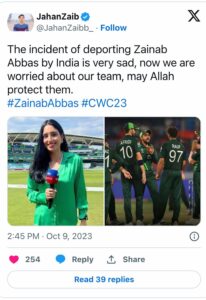A Sudden Farewell in India
On October ninth, Zainab Abbas, the prestigious Pakistani ICC World Cup moderator, made an unexpected takeoff from India, refering to somewhere safe and secure worries as her essential inspiration. Her decision to leave the country has triggered a wave of discussions, shedding light on the intricacies of freedom of expression and its repercussions in the digital age.
The Spark of Controversy
The controversy that eventually led to Zainab Abbas’s exit from India began when she excitedly announced her role as a presenter at the ICC Cricket World Cup 2023, hosted by India. Her social media proclamation, posted on October 2nd, was meant to convey her enthusiasm for the upcoming event. Nonetheless, what followed was an unforeseen tempest of complaints and kickback, fundamentally starting from one client with the handle “YearOfTheKraken.
Unearthing Past Tweets on India
YearOfTheKraken, having taken issue with Zainab Abbas’s selection, embarked on a journey through her social media history, unearthing old tweets containing inflammatory and offensive content. One particular tweet caught the spotlight, where Zainab Abbas vented her frustration, saying, “This 120 crore population can’t produce one fast bowler. Eat some f*c*ing meat u shud shakaharis.” This tweet not only questioned the cricketing prowess of the Indian team but also carried an offensive tone.
If you want to know more info about this controversy click the article.

Offensive Remarks Targeting a Community
In yet another tweet, Zainab Abbas used derogatory language related to cow urine to taunt Indians, particularly Hindus, stating, “..true it does Man went Delhi, and it smells of cow piss. Oops, that’s their maa Kaali maa.” This inflammatory language not only targeted a specific community but also insulted an integral aspect of Hinduism.
The Resurfacing of Past Actions
Despite Zainab Abbas having deleted these posts and changing her online identity years ago, the enduring memory of the internet ensured that these comments resurfaced, casting a shadow over hercontributionin the Cricket World Cup 2023.
Legal Action and Consequences
The situation escalated on October 6th when Supreme Court lawyer Vineet Jindal took legal action against her by filing a formal complaint, dated October fourth. In his objection, Jindal blamed Zainab Abbas for making enemies of India and Hinduphobic articulations. He urged the Cyber Cell of Delhi Police to register an FIR against her under sections 153A, 295, 506, 121 of the Indian Penal Code (IPC), and section 67 of the Information Technology (IT) Act. These sections deal with promoting enmity between different groups, deliberate and malicious acts intended to outrage religious feelings, and criminal intimidation. Furthermore, they encompass offenses related to disturbing public tranquility and using a computer resource for transmitting offensive content.
Pakistani fans Twittes at Zainab Abbas’s exit




Calls for Accountability
Zainab Abbas’s exit from India due to security concerns is a clear sign of the precarious trade-off between the opportunity to make a statement and the responsibility that comes with it. While the web provides a stage for people to express their ideas, it also holds them accountable for their words and actions, even long after they are posted. In an undeniably inclusive world that values diverse communities and beliefs, fire and hostile comments depend on examination and legitimate consequences.
The Larger Lesson.
Amid the controversy following Zainab Abbas’s take-off from India, her story shows the importance of building a culture of resistance, respect and fair play in the sports arena. It fills in as a strong update that should retain the power to bring games together as opposed to dividing them. Indeed, even those in the public eye must exercise caution and responsibility when using virtual entertainment platforms, and understand the wider implications of their words in today’s interconnected world.


